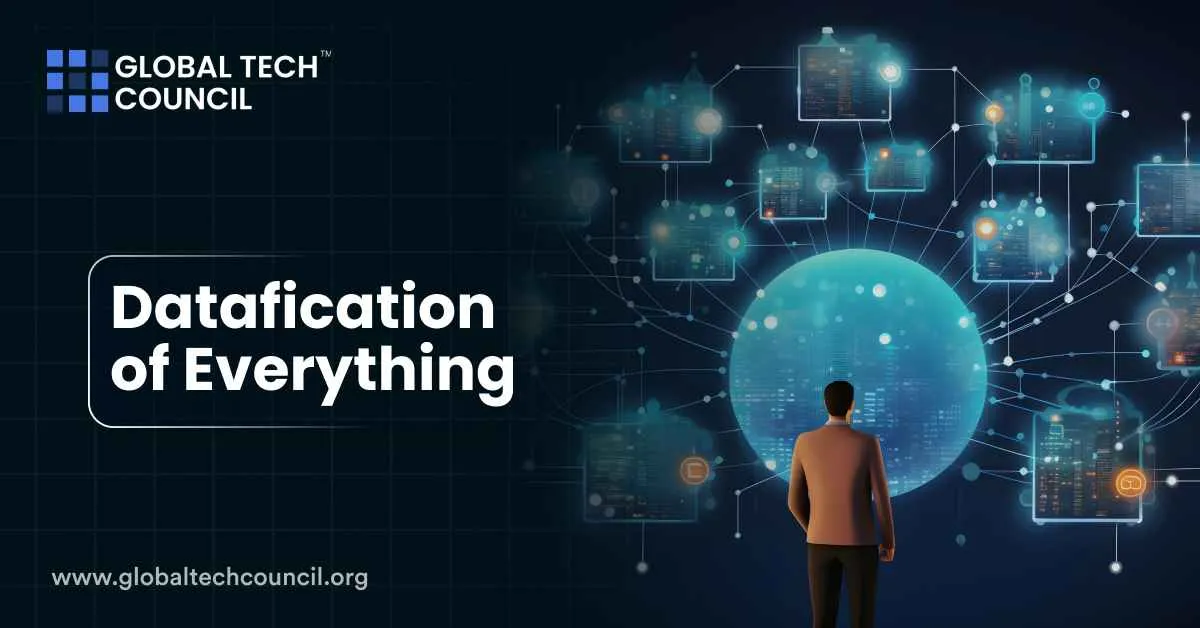 Almost every action we take leaves behind data. From what we buy, to how we scroll, to where we move, everything is being tracked and converted into insights. This trend is known as datafication. For businesses, it is not just about collecting information but about transforming daily life into usable knowledge. Done right, it gives companies the power to design better campaigns, improve services, and discover opportunities that would otherwise be invisible. For professionals aiming to lead in this new world, a Marketing and Business Certification is a practical way to apply these concepts with confidence.
Almost every action we take leaves behind data. From what we buy, to how we scroll, to where we move, everything is being tracked and converted into insights. This trend is known as datafication. For businesses, it is not just about collecting information but about transforming daily life into usable knowledge. Done right, it gives companies the power to design better campaigns, improve services, and discover opportunities that would otherwise be invisible. For professionals aiming to lead in this new world, a Marketing and Business Certification is a practical way to apply these concepts with confidence.
What Datafication Really Means
Datafication goes beyond the idea of big data. It is not only about the volume of information but also about converting different parts of life into measurable signals. Structured data like purchase history is obvious, but unstructured data such as reviews, social posts, and even voice interactions are also being turned into metrics. In marketing, this allows companies to map customer behavior more deeply than demographics ever could.
Why Businesses Embrace Datafication
The drive for personalization and real-time engagement is at the heart of this trend. Customers no longer accept generic messages. They want interactions shaped to their interests, needs, and timing. Datafication supports this by capturing details across touchpoints. At the same time, the decline of third-party cookies makes first-party data more valuable. By creating privacy-safe ways to capture signals, companies can still personalize without breaking trust.
How Datafication Works in Practice
Customer Insights
Surveys, social media comments, and product reviews become structured input for sentiment analysis. This helps brands identify what customers enjoy and where frustrations lie.
Operational Processes
Supply chains, logistics, and product usage data reveal inefficiencies. When every step is captured as data, bottlenecks become easier to detect and fix.
Marketing Measurement
Campaign performance can be tracked across multiple channels. With datafication, multi-touch attribution and predictive models show which actions truly drive conversions.
For those interested in applying these methods technically, a Data Science Certification offers the tools to turn raw data into actionable insights.
Benefits of Datafication
Businesses using datafication can:
- Deliver highly personalized customer experiences
- Spot trends earlier through continuous monitoring
- Make operations leaner by reducing waste and downtime
- Base decisions on real evidence, not guesswork
- Build stronger relationships by responding to customer signals faster
Challenges and Risks
The promise of datafication also comes with risks. Collecting too much can lead to data overload, where important signals are buried in noise. Ethical concerns matter too. Customers may feel over-surveilled if companies are not transparent. Regulations such as GDPR and CCPA demand clear consent and careful use of personal information. Many organizations also face a skills gap, lacking teams that can manage complex data pipelines. For leaders building advanced strategies, a deep tech certification can provide knowledge of secure and scalable approaches.
Future Directions of Datafication
The next phase of datafication is not only about capturing more data but about making it more meaningful. Trends include:
- Privacy-first design: using anonymization and secure storage to build trust.
- Integration of diverse streams: bringing together behavioral, transactional, location, and unstructured data.
- Real-time analytics: adjusting campaigns instantly as customer behavior changes.
- Measuring maturity: organizations are benchmarking their data readiness to invest smarter.
- Continuous experimentation: running constant tests to refine marketing and business strategies.
Examples of Datafication in Action
| Business Area | How Datafication Adds Value |
| Customer Experience | Social reviews and feedback converted into sentiment scores |
| Retail Marketing | Transaction history used to predict future product demand |
| Healthcare | Patient wearable data transformed into preventive care insights |
| Finance | Transactional records flagged for fraud detection and compliance |
| Logistics | GPS and delivery data reveal supply chain bottlenecks |
| Education | Student activity logs used to adapt learning paths |
| Media & Entertainment | Streaming data turned into content recommendation engines |
| Smart Cities | Sensor data guiding energy, traffic, and waste management |
| Human Resources | Employee surveys analyzed to track satisfaction and retention |
| Product Development | Usage data converted into features for future releases |
Conclusion
Datafication is more than a buzzword. It is the steady conversion of life into numbers that businesses can use for sharper insights. The companies that succeed will be those that manage this responsibly—balancing personalization with privacy, and scale with clarity.